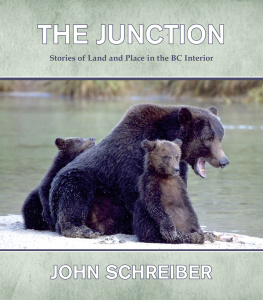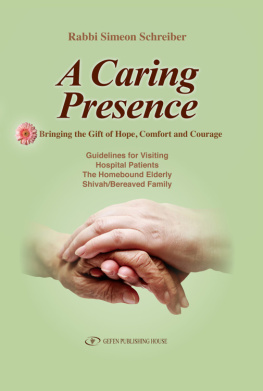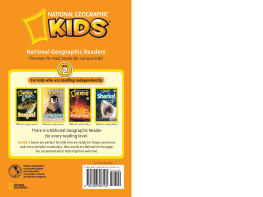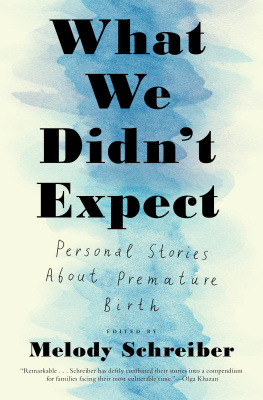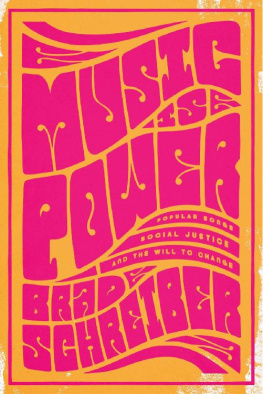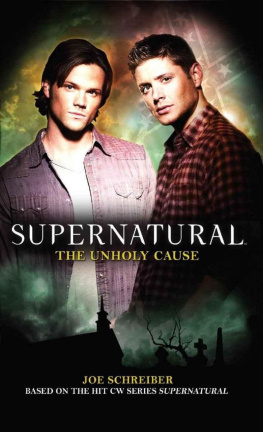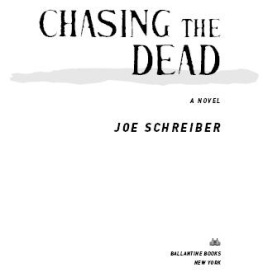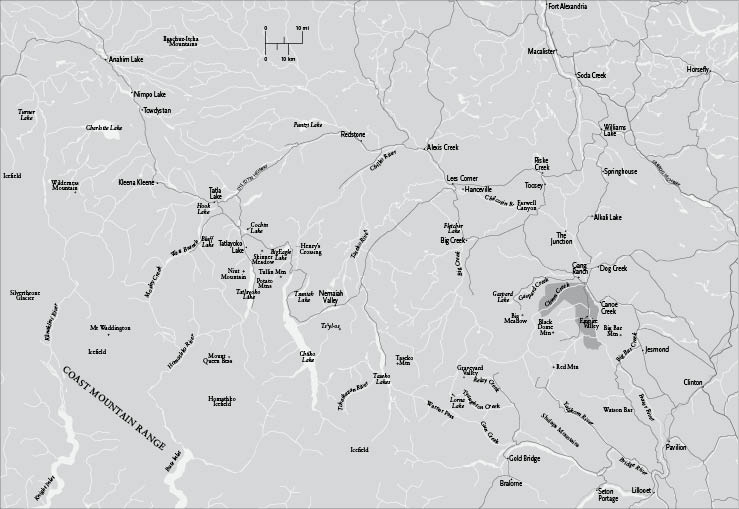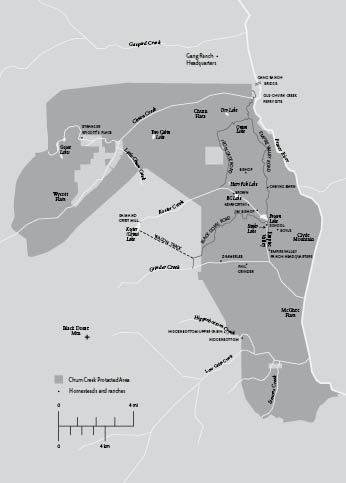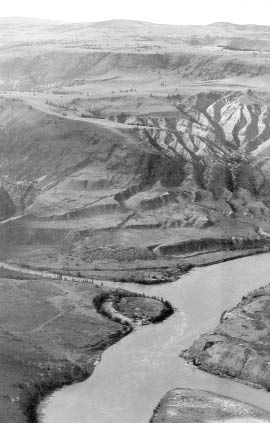
An aerial view of the Junction, where the Chilcotin and Fraser rivers come together. Photo courtesy of Earl Cahill and Don Logan.
Copyright 2014 John Schreiber
All rights reserved. No part of this publication may be reproduced, stored in a retrieval system or transmitted, in any form or by any means, without prior permission of the publisher or, in the case of photocopying or other reprographic copying, a licence from Access Copyright, the Canadian Copyright Licensing Agency, .
Caitlin Press Inc.
8100 Alderwood Road,
Halfmoon Bay, BC V0N 1Y1
caitlin-press.com
Text design and EPUB by Kathleen Fraser.
Cover design by Vici Johnstone.
Cover photo courtesy of Larry Travis, Raincoast Images, and Jane Woodland and Chris Genovali, Raincoast Conservation Foundation.
Edited by Audrey McClellan.
Caitlin Press Inc. acknowledges financial support from the Government of Canada through the Canada Book Fund and the Canada Council for the Arts, and from the Province of British Columbia through the British Columbia Arts Council and the Book Publishers Tax Credit.
Library and Archives Canada Cataloguing in Publication
Schreiber, John, 1941, author
The junction : stories of land and place in the BC interior / John
Schreiber.
Includes bibliographical references.
ISBN 978-1-927575-11-6 (EPUB.)
1. Schreiber, John, 1941 TravelBritish ColmubiaCariboo
Region. 2. Cariboo Region (B.C.)Description and travelAnecdotes.
3. Cariboo Region (B.C.)Social life and customs21st century
Anecdotes. I. Title.
FC3845.C445S29 2013 917.1175045 C2013-905671-8
For Don Logan, whose generosity, fine historic photocopies and detailed knowledge were essential in the creation of stories in The Junction.
For my brothers, Chris and Andrew, who thoroughly understand what it means to be rural in wild places out there in wilderness.
For Marne, always supportive and always central to my existence.
And for Lari, who has moved on.
In our thoughtworld, myth and reality are opposites. Unless we can find some way to understand the reality of mythic thinking, we will remain prisoners of our own language, our own thoughtworld. In this world one story is real, the other fantasy. In the Indian way of thinking both stories are true because they describe personal experience. Their truths are complementary.
Fox and Chickadee
in Little Bit Know Something
Robin Ridington
From the Tibetan perspective, to go into the mountains blind, knowing nothing of proper ritual protocols, living in complete ignorance of anything but what lies on the surface of perception, was an act of complete folly. To enter the hidden lands of Khenbalung without adequate spiritual protection, as the British [mountaineers] were destined to do, would seem a sign of madness.
Into the Silence
Wade Davis
Contents
Southern Alberta
Introduction
Passing through Writing-On-Stone
We shall not cease from exploration
And the end of all our exploring
Will be to arrive where we started
And know the place for the first time.
T.S. Eliot, Little Gidding
Throughout my life Ive been focused on places: British Columbian places, Coast and Interior, Western Canadian places; the list of communities and cities where Ive lived, however briefly in some cases, is long. They are mostly rural and range from Duncan, Vancouver, Port McNeill, Mahatta River, Moresby Camp and Victoria on the coast to Darfield, Mount Currie and Prince George inland, all in the southern half of this province. I could name a few more short stops: Jeune Landing, Holberg, Woodfibre, and Nitinat Camp on Cowichan Lake. The latter was named Camp Three when my family lived there for several months in 1943. Our front street consisted of steel railroad tracks spiked to wooden ties. I was only two years old, but my memories of our time there are powerful; certain events are sharp in my mind even now. To this day, the pungent smell of hedge nettle in spring (a Camp Three memory), wafting through my open car window, just about drives me off the road. A ravens croak hanging in still air, evocative of a breezeless, Cowichan blue-sky summer walk along the tracks with my mother, stops me cold.
There are places farther north that Ive ventured to: places like Fort St. James, Grassy Plains, Hazelton, Kitwancool, Fort St. John, Hudsons Hope, Mile Wonowon, Whitehorse and Tatshenshini-Alsek Provincial Park, where Ive paused and looked around. The last named is a truly wild place in the extreme northwestern corner of this province where Alaska, British Columbia, Yukon, and many tall mountains and massive amounts of snow, rock and shifting ice come together. There are a few places on the far side of the Rocky Mountains in AlbertaJasper, Banff, Red Deer, Rocky Mountain House, Fort Macleod and Watertonwhere Ive lingered for a few days, and others, like Writing-on-Stone out on the open prairies down south, that Ive seen but hardly know at all.
Two of the various occupations Ive worked at, as a parole officer in 1972, and for the Union of BC Indian Chiefs in 1973, both out of Prince George, necessitated that I travel; thus, I have stopped to do business of one kind or another at a large majority of the inhabited Indian Reserves in the BC Interior. Over the years, then and since, I have gained a general sense of the lay of the land and run of the rivers across much of this western land we are so privileged to inhabit and admire.
I like to see the country, and so does my partner, Marne; we enjoy travelling together and have done so for years. Recently, in the continued spirit of visiting and revisiting interesting places out here in the West, Marne and I decided we would drive north to Jasper, then veer slowly south along the Icefields Parkway in the shadow of the great Rocky Mountain chain through Banff and Kananaskis to Longview on Highway 22. Marne had not done that awe-inspiring drive before, and I wanted to share the experience with her. From some point south of Longview we would cut across the foothills and ranchlands of southern Alberta to Writing-on-Stone Park on the Milk River north of the American border. We chose to travel in late Augustearly September to avoid traffic and bugs if possible; our intention was to go at a relaxed pace, overnighting in motels or campsites according to the weather and whatever showed up.

